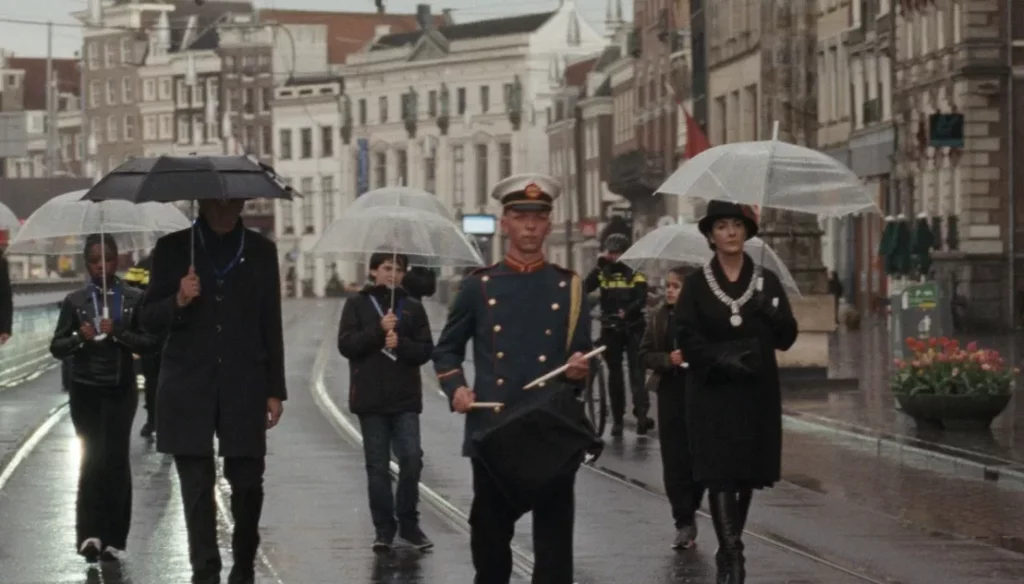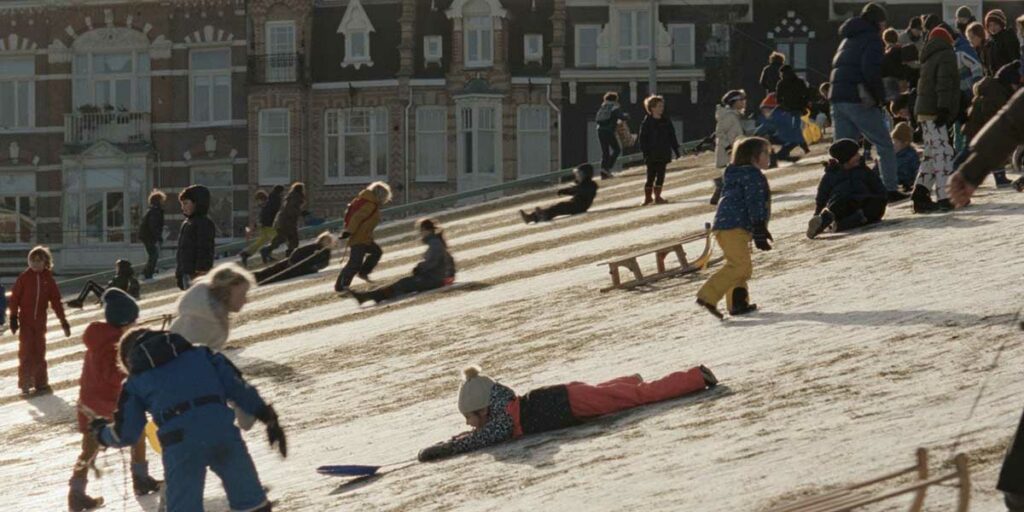Steve McQueen’s latest documentary, Occupied City, is a stunning film of monumental proportions where the past encounters the present.
With its run-time of 262 minutes, Occupied City is an intimidating film, to say the least. If you can get past its length, however, you will find out that this movie is truly a work of art. While I will admit that not everything in the documentary worked for me, I have to give director Steve McQueen credit where credit is due, as I have never seen anything like it. A true test for a great filmmaker, this film treats its subject matter in such a unique way that was able to capture my interest from the very beginning.
Based on Bianca Stigter’s book “Atlas of an Occupied City, Amsterdam 1940-1945,” Occupied City examines the Nazi occupation of Amsterdam and its effects on the city and its inhabitants. While doing so, McQueen visually draws a compelling parallel to the present as the narration of the Nazi occupation of the city is juxtaposed to today’s struggles, from the covid pandemic to Ukrainian refugees, and reasons for protest, including racism, police brutality, the dangerous rise of the far right. All of these create an interesting comparison, as the documentary seems to ask us whether history is always bound to repeat itself.
In Occupied City, past and present merge. The Amsterdam of today and that of the past exist in the same breath, both struck by their tragedies, respectively the struggles of our modern age and the Nazi occupation of the city. The first one is delivered visually and the latter narratively, thus creating a double intertwined timeline. With this documentary, McQueen makes us reflect on how the past is constantly informing our present, so much so that the geography of the city is necessarily related to one of the most significant moments of its history.
Throughout Occupied City, I kept asking myself if such a long runtime was truly needed and, while I may have doubted that during the first half, after the intermission I began to see why it was necessary to truly explore every single story within the context of the city, in a way that none of them feels left behind. Despite its rather lengthy runtime, I felt like the documentary would have done with more breath, allowing the audience more time to sit with each story before moving on to the next one. I also wish we could have seen some visuals of the past timeline, which would have helped the audience feel more emotionally attached to the people we solely hear about and ultimately care about them.

While the documentary’s use of present-day visuals is impressive, I think Occupied City would have benefitted from found footage to break up its narrative, which feels slightly repetitive by the time the intermission starts. However, having that said, the absence of any type of archival footage is extremely powerful and relevant. Part of the inherent horror of the Holocaust is in the attempt by its perpetrators to destroy it ever existed, which is why we have little photographic evidence of the concentration camps. But this film reminds us that while the visual evidence may be limited, we can hear first-hand accounts of this massacre.
It is also particularly significant that we get to hear a direct account of the occupation of Amsterdam, including the stories of those lives who were lost in the concentration camps and those who were able to escape, in an age when the memory of the Holocaust seems to be fading away. Despite the constant and necessary efforts to never forget, the reality is that this may very well be the last generation that gets to hear a direct account of the Holocaust from its survivors, many of whom have now passed away. And this is why movies like Occupied City are incredibly needed to keep that memory alive even when those who have lived it are gone.
The final sequences of Occupied City are truly where the heart of the film is, and perhaps even the reason why it was made in the first place, making sitting through 4 hours and a half of it incredibly worth it. At the end, we get to see a young Jewish boy practising his religion freely and running around the city with his friends, followed by a final tracking shot that takes us around Amsterdam one last time. Although Occupied City may not be a film for everyone, due to its runtime and experimental style, it is an interesting documentary. While conceptually it creates an interesting parallelism and raises excellent questions, it is a hard film to sit through if you are not particularly invested in the subject matter or its style of documentary.
Occupied City was screened at the 2023 BFI London Film Festival. The film will be released in US theaters on December 25, 2023 and in UK & Irish cinemas on February 9, 2024.

